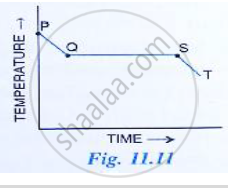Advertisements
Advertisements
प्रश्न
The specific heat capacity of a substance A is 3,800 Jkg `"^(–1)K^(–1)` and that of a substance B is 400 `"^(–1)K^(–1)`. Which of the two substances is a good conductor of heat ? Give a reason for your answer.
उत्तर
SA = 3,800 Jkg `"^(–1)K^(–1)`
SA = 400 Jkg `"^(–1)K^(–1)`
B is a good conductor.
∴ The specific heat is less, i.e. amount of heat required to raise the temperature of unit mass of a substance by 1°C is less.
APPEARS IN
संबंधित प्रश्न
Fig 11. 11 shows the variation in temperature with time when some wax cools from the liquid phase to the solid phase.
(i) In which part of the curve, the wax is in liquid phase?
(ii) What does the part QS of the curve represent?
(iii) In which part of the curve, the wax will be the in the liquid as well as solid phase?
(iv) In which part of the curve, the wax is in solid phase?

1 kg of ice at 0°C is heated at a constant rate and its temperature is recorded after every 30 s till steam is formed at 100℃. Draw a temperature time graph to represent the change of phase.
A mass of 200 g of mercury at 100°C is poured into water at 20°C. If the final temperature of the mixture is 25°C, find the mass of water. (Sp. heat cap. of mercury is 140 J/kgK).
Give scientific reasons for the following:
Bottled drinks are cooled more effectively when surrounded by lumps of ice than by cold water at 0°.
Fill in the following blank using suitable word:
1 cal = .......... J
Which requires more heat: 1 g ice at 0°C or 1 g water at 0°C to raise its temperature to 10°C? Explain your answer.
1 kg of ice at 0o is heated at constant rate and its temperature is recorded after every 30 s till steam is formed at 100o C. Draw a temperature time graph to represent the change of phase.
State two impacts of global warming on the life on earth.
